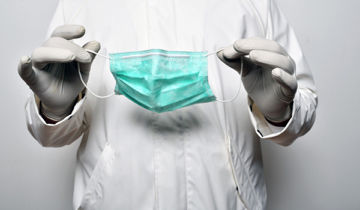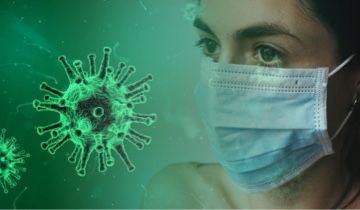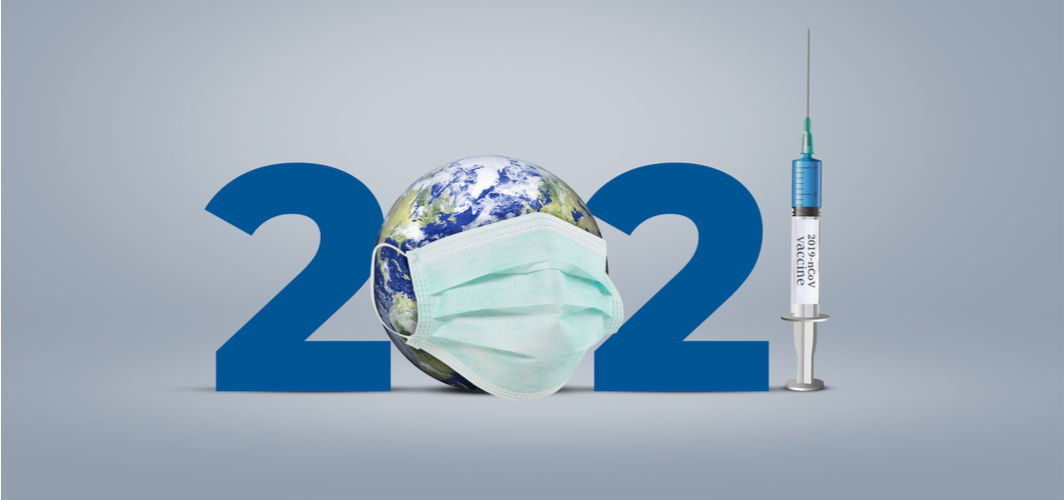Coronavirus Updates
World Thyroid Day 2021: The link between thyroid disease and COVID-19
5 min read
By Apollo 24/7, Published on - 31 May 2021, Updated on - 18 October 2022
Share this article
0
29 likes

The thyroid is a butterfly-shaped gland present just below Adam’s apple. The thyroid gland produces two hormones, thyroxine (T4) and triiodothyronine (T3). The production and release of these hormones are controlled by the thyroid-stimulating hormone (TSH), which is formed in the pituitary gland (present at the base of the brain). Thyroid hormones help in maintaining the metabolism of the body. However, due to thyroid dysfunction, the gland may start producing either excessive or insufficient hormones, which disrupts the metabolism.
Every year, 25th May is observed as World Thyroid Day to increase awareness about the prevalence of thyroid diseases and to promote new treatment modalities. At this time of the COVID-19 pandemic, it is even more important to understand thyroid diseases as some studies indicate that people with thyroid disease may be at increased risk of severe COVID-19 outcomes. However, more research is needed to establish this.
What are thyroid diseases?
Any medical condition that causes the thyroid gland to produce excess or insufficient hormones is referred to as thyroid disease. It is categorised into hyperthyroidism and hypothyroidism:
1. Hyperthyroidism
Hyperthyroidism is a condition marked with increased thyroid hormone in the bloodstream due to an overactive thyroid gland. Due to excess thyroid hormones, the metabolism accelerates resulting in sudden weight loss and other symptoms. The causes of hyperthyroidism include:
- Graves’ disease (an autoimmune disease where the immune system attacks the thyroid gland to make more thyroid hormone)
- Inflammation of the thyroid gland (thyroiditis) either after delivery of a baby or due to the consumption of medications such as interferon and amiodarone
- A lump or cell growth in the thyroid gland (thyroid nodules)
- Consumption of too much iodine.
Pre-existing autoimmune disorder and smoking may increase the risk of developing hyperthyroidism.
2. Hypothyroidism
Hypothyroidism is a condition marked by a lack of enough thyroid hormones in the blood, resulting in a slowing down of the metabolism. Causes of hypothyroidism include:
- Hashimoto’s disease (an autoimmune disease where immune cells destroy the thyroid gland)
- Inflammation of the thyroid gland (thyroiditis)
- Iodine deficiency
- Previously treated thyroid disease (radiation or surgical removal of the thyroid gland)
- Treatment of hyperthyroidism (radiation and surgical removal of the thyroid)
Hypothyroidism can be genetically transferred, thus people with a family history of the underactive thyroid gland are at increased risk of developing the same.
What are the symptoms of thyroid problems?
The symptoms of hyperthyroidism include:
- Sudden weight loss despite having no change in the diet or exercise
- Change in behaviour such as nervousness, irritation and mood swings
- Anxiety
- Enlarged thyroid gland (goitre)
- Muscle weakness resulting in tremors
- Sensitivity to heat
- Irregular menstrual cycle
- Difficulty falling asleep
- Irritation in the eyes or vision problems
- Bulging or popping of eyeballs
The symptoms of hypothyroidism include:
- Sudden weight gain despite having no change in the diet
- Persistent fatigue
- Sensitivity to cold temperatures
- Weak hair and nails
- Severe hair fall
- Dry skin
- Muscle cramps
- Hoarseness of the voice
- Forgetfulness
- Frequent and heavy menses (periods).
Can thyroid problems be treated?
Thyroid treatment aims to restore the thyroid hormone levels to normal. The treatment for thyroid diseases depends on the underlying cause. Treatment options for hyperthyroidism include:
- Use of anti-thyroid drugs to stop the thyroid from making hormones.
- Use of radioactive iodine therapy to destroy some of the cells of the thyroid gland to prevent excess production of thyroid hormones.
- Surgical removal of the thyroid gland.
Meanwhile, people diagnosed with hypothyroidism require a man-made thyroid replacement medication (levothyroxine), which helps in maintaining the thyroid levels in the body. This medication has to be taken daily lifelong.
Pre-existing thyroid disease and COVID-19 infection
Some studies have shown that pre-existing thyroid disease may increase the risk for severe COVID-19. For instance, a meta-analysis of 8 studies published in the journal Diabetes and Metabolic Syndrome in October 2020 concluded that people suffering from thyroid disease (both hypo and hyperthyroidism) could be at increased risk of developing COVID-19 infection. The study found that:
- People with thyroid disease have an increased number of pro-inflammatory immune cells such as TNF-α and IL-6 in their body, which can increase the severity of the viral infection.
- It was further added that due to excess or deficient thyroid hormones, there is dysregulation of the innate immune system, which increases the risk for severe infection.
However, several studies have contradicted this theory and have reported no association of pre-existing thyroid disease with the worsening of COVID-19 infection. Some of these studies include:
- A study published in the journal The Lancet on 1st April 2021 stated that people diagnosed with hypothyroidism or hyperthyroidism do not have an increased risk of developing severe COVID-19 infection. They further added that the treatment of thyroid disease does not influence the prognosis of COVID-19 infection.
- Large research involving more than 3000 COVID patients published in the journal Frontiers in Endocrinology in August 2020 found that pre-existing hypothyroidism does not increase the severity or worsen the outcomes of COVID-19 infection.
COVID-infected patients may develop thyroid disease
While scientists are finding out the association between pre-existing thyroid disease and COVID-19 infection, doctors have reported cases of new thyroid disease in patients suffering from COVID-19. Subacute thyroiditis is a rare form of thyroid inflammation characterized by pain and tenderness in the thyroid gland, which can radiate to the ears. The person may also experience fever, malaise (uneasiness), and loss of appetite.
A few case studies that reported the development of thyroid disease in COVID-patients, who previously had healthy thyroid function, include:
- According to a case report published in Oxford’s Journal of Clinical Endocrinology and Metabolism in May 2020, COVID-19 infection can result in subacute thyroiditis. An 18-year-old woman was diagnosed with subacute thyroiditis 15 days after she reported positive for COVID-19 infection.
- Another case study published in the Journal of Endocrinological Investigation in June 2020 also reported a case of subacute thyroiditis while the patient was hospitalized due to COVID-19 infection.
- A case study published in the European Thyroid Journal in September 2020 also reported the development of subacute thyroiditis in a 41-year-old woman, 4 weeks after she got diagnosed with COVID-19 infection.
All these patients recovered completely after being treated with steroids and anti-inflammatory medications.
Conclusion
More than 42 million Indians are reported to suffer from thyroid disease, where the cases of hypothyroidism outnumber the cases of hyperthyroidism. However, doctors believe that people with thyroid disease can live a healthy life by consuming a balanced diet, exercising daily, and taking prescribed thyroid medications regularly. Thyroid levels must be checked frequently as it would help the doctor monitor the treatment and make adjustments accordingly.
Coronavirus Updates
Leave Comment
Recommended for you

Coronavirus Updates
A Commoner’s Guide to Wearing Masks Correctly
Wearing masks can restrict the spread of the Coronavirus but only if used the right way and when combined with other practices like social distancing and hand hygiene.

Coronavirus Updates
Exploring the Impact of COVID-19 on Men’s Health
Research suggests that COVID 19 survivors are at a risk of developing sexual, psychological and cardiovascular health issues. Read to know more.

Coronavirus Updates
How do I reduce the risk of getting COVID-19?
The coronavirus is easily transmitted and hence, you should take precautionary measures such as physical distancing, washing hands frequently, covering your mouth while coughing or sneezing, refrain from activities that weaken the lungs (for.eg. smoking), etc.
Subscribe
Sign up for our free Health Library Daily Newsletter
Get doctor-approved health tips, news, and more.
Visual Stories

Covid-19 Updates: Are Things Getting Brighter?
Tap to continue exploring
Recommended for you

Coronavirus Updates
A Commoner’s Guide to Wearing Masks Correctly
Wearing masks can restrict the spread of the Coronavirus but only if used the right way and when combined with other practices like social distancing and hand hygiene.

Coronavirus Updates
Exploring the Impact of COVID-19 on Men’s Health
Research suggests that COVID 19 survivors are at a risk of developing sexual, psychological and cardiovascular health issues. Read to know more.

Coronavirus Updates
How do I reduce the risk of getting COVID-19?
The coronavirus is easily transmitted and hence, you should take precautionary measures such as physical distancing, washing hands frequently, covering your mouth while coughing or sneezing, refrain from activities that weaken the lungs (for.eg. smoking), etc.